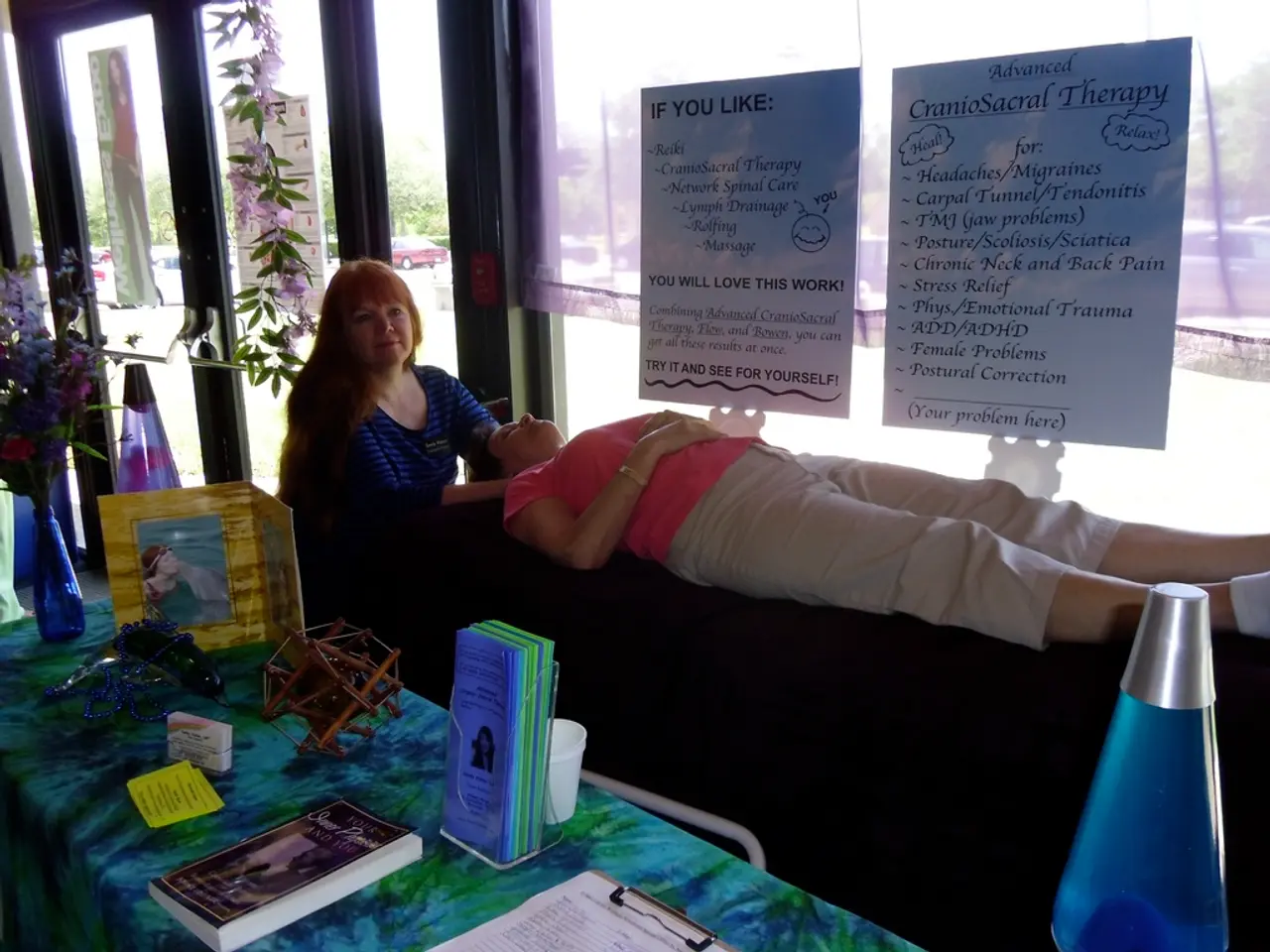Differentiating Anxiety and Depression: Crucial Distinctions and Efficient Remedies
Mental health conditions such as anxiety and depression are common yet complex issues that affect millions of people worldwide. While these conditions share some similarities, they have distinct characteristics, causes, and treatment strategies.
Key Differences
Anxiety and depression differ in their core symptoms, emotional tone, typical duration, and impact on functioning.
- Core Symptoms: Anxiety is characterised by excessive worry, fear, and nervousness, accompanied by physical signs like rapid heartbeat, sweating, and difficulty concentrating. Depression, on the other hand, presents as persistent sadness, hopelessness, and a lack of interest or pleasure in activities.
- Emotional Tone: Anxiety often involves heightened arousal and fear, while depression is marked by low mood and emotional numbness.
- Typical Duration: Anxiety can be acute or chronic, sometimes triggered by specific situations, while depression is usually chronic and pervasive, often lasting weeks or months.
- Impact on Functioning: Anxiety may impair focus and cause avoidance behaviours, while depression often results in withdrawal, low motivation, and impaired daily functioning.
Causes
Anxiety
Anxiety arises from a combination of genetic predisposition, brain chemistry imbalances, personality factors, and environmental triggers such as stress or trauma. It often involves hyperactivity of the brain's fear circuits and heightened physiological arousal.
Depression
Depression can occur with or without an identifiable trigger. Situational depression follows stressful or traumatic events but usually improves with time, while clinical depression (major depressive disorder) can manifest without specific events and tends to be more severe and longer lasting. Neurochemical imbalances, genetics, and psychosocial factors contribute to the development of depression.
Symptoms
Anxiety symptoms
Anxiety symptoms involve persistent worry, fear, irritability, rapid heartbeat, shortness of breath, sweating, trembling, gastrointestinal issues, difficulty concentrating, and a sense of impending doom.
Depression symptoms
Depression symptoms include persistent sadness, feelings of hopelessness, lack of energy, sleep and appetite disturbances, diminished ability to function in daily life, and increased risk of suicide in severe cases.
Proven Scientific Treatment Strategies
Psychotherapy
- Anxiety: Cognitive-behavioral therapy (CBT), Exposure therapy (facing fears to reduce avoidance), Mindfulness-based cognitive therapy, Acceptance and commitment therapy (ACT)
- Depression: Cognitive-behavioral therapy (CBT), Interpersonal therapy, Behavioral activation
Medications
- Anxiety: First-line: Selective serotonin reuptake inhibitors (SSRIs), Serotonin-norepinephrine reuptake inhibitors (SNRIs); Others: benzodiazepines (short-term), buspirone, beta-blockers for physical symptoms, hydroxyzine
- Depression: Antidepressants including SSRIs, SNRIs, tricyclic antidepressants; sometimes augmentation with other agents
Lifestyle Interventions
- Anxiety and Depression: Regular exercise, sleep hygiene, avoiding caffeine/alcohol, stress management, exercise, sleep hygiene, healthy diet, social support
Additional Notes
- Anxiety treatment focuses on reducing hyperarousal and preventing avoidance behaviour. Exposure therapy is particularly effective in anxiety disorders.
- Depression, especially clinical depression, may require ongoing treatment and monitoring for suicide risk; situational depression might resolve when the triggering stressor resolves.
- Both conditions benefit from early professional intervention, and medications are often combined with psychotherapy for best outcomes.
In conclusion, understanding the differences between anxiety and depression is essential for effective treatment. Both conditions have well-established, scientifically supported treatments combining psychotherapy, pharmacotherapy, and lifestyle changes. If you or someone you know is struggling with anxiety or depression, seeking professional help is crucial.
- recovery from anxiety may involve techniques such as cognitive-behavioral therapy, exposure therapy, and mindfulness-based cognitive therapy, while treatment for depression may include cognitive-behavioral therapy, interpersonal therapy, and behavioral activation.
- training one's muscle strength, dietary habits, and exercise routine can play a significant role in the overall health and wellness of an individual struggling with anxiety or depression.
- as part of their health-and-wellness routine, those dealing with anxiety may find running or other cardiovascular exercises beneficial for managing symptoms, while meditation and yoga can aid in improving mental health.
- a healthy nutrition, exercise, and skin care regimen can contribute to the overall health and well-being of individuals struggling with mental health conditions like anxiety and depression.
- motivation to engage in self-care activities like exercise, healthy eating, and meditation is crucial for individuals recovering from anxiety or depression, as it can help improve their mental health and overall well-being.
- workplace-wellness initiatives that focus on mental health, such as promoting exercise and stress management techniques, can play a significant role in helping employees cope with anxiety and depression.
- mental health, skin care, and nutrition are all interconnected, and taking care of one's mental health can help improve the condition of their skin and overall health.
- understanding the differences between anxiety and depression, such as their core symptoms, emotional tone, typical duration, and impact on functioning, is essential for developing effective treatment strategies for each condition.
- the science behind anxiety and depression treatment has extensively studied the use of medications, including selective serotonin reuptake inhibitors (SSRIs) and serotonin-norepinephrine reuptake inhibitors (SNRIs), as well as lifestyle changes like regular exercise and avoiding caffeine/alcohol.
- seeking professional help for anxiety or depression is crucial, as early intervention can help ensure the best possible outcomes for recovery, and professionals can work with individuals to develop a treatment plan that combines psychotherapy, pharmacotherapy, and lifestyle changes.




